

Growing social media backlash among young people, survey shows. Almost two-thirds of schoolchildren would not mind if social media had never been invented, a survey has indicated.
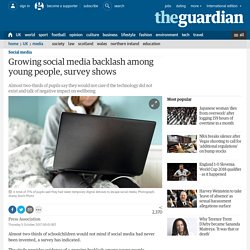
The study provides evidence of a growing backlash among young people disillusioned with the negative aspects of the technology, such as online abuse and fake news. As well as the 63% who would not care if it did not exist, even more pupils (71%) said they had taken temporary digital detoxes to escape social media. The survey of about 5,000 students at independent and state schools in England was commissioned by Digital Awareness UK and the Headmasters’ and Headmistresses’ Conference (HMC), which represents the headteachers of independent schools around the world. Many respondents indicated that social media was having a negative impact on their emotional wellbeing. While more than 60% believed friends showed a “fake version” of themselves on social media, 85% of pupils questioned denied they were guilty of that themselves.
Schools Are Slow to Learn That Sleep Deprivation Hits Teenagers Hardest. An Athlete Felled by Concussions, Despite Playing a ‘Safer’ Sport. Teens, Social Media & Technology Overview 2015. 24% of teens go online “almost constantly,” facilitated by the widespread availability of smartphones.
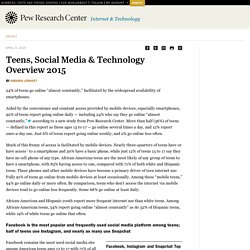
Aided by the convenience and constant access provided by mobile devices, especially smartphones, 92% of teens report going online daily — including 24% who say they go online “almost constantly,” according to a new study from Pew Research Center. More than half (56%) of teens — defined in this report as those ages 13 to 17 — go online several times a day, and 12% report once-a-day use. Just 6% of teens report going online weekly, and 2% go online less often. Much of this frenzy of access is facilitated by mobile devices. Nearly three-quarters of teens have or have access to a smartphone and 30% have a basic phone, while just 12% of teens 13 to 17 say they have no cell phone of any type.
African-American and Hispanic youth report more frequent internet use than white teens. New versions of Tweetbot for iPhone, iPad, and Mac are on the way. Many of us have been eagerly awaiting a new version of Tweetbot for iPad for quite a while now, as well as an updated version of Tweetbot for Mac.
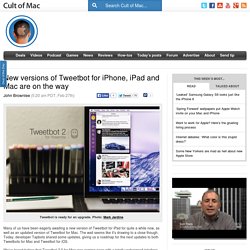
The wait seems like it’s drawing to a close though. Today, developer Tapbots shared some updates, giving us a roadmap for the next updates to both Tweetbots for Mac and Tweetbot for iOS. We’ve heard before that Tweetbot 2.0 for Mac was coming soon with a totally redesigned interface appropriate to OS X Yosemite, including new lickable candy icons and other UI elements, but now we have a date. Tapbots says Tweetbot 2.0 for Mac should arrive before this year’s Worldwide Developers Conference, which usually comes in June.
It will be a free update for existing users. Not into Tweetbot? What’s taken so long? Source Tapbots. Here’s how a real teenager uses, and doesn’t use, social media. There’s a whole category of social-science fallacy that revolves around extrapolating from one or two cases, so we should be careful not to read too much into a recent Medium post by 19-year-old Andrew Watts about how he and his friends use various social-media platforms.
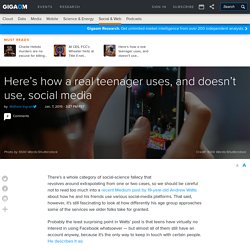
That said, however, it’s still fascinating to look at how differently his age group approaches some of the services we older folks take for granted. Probably the least surprising point in Watts’ post is that teens have virtually no interest in using Facebook whatsoever — but almost all of them still have an account anyway, because it’s the only way to keep in touch with certain people. He describes it as: “Something we all got in middle school because it was cool but now is seen as an awkward family dinner party we can’t really leave.” Instagram is number one “Facebook is often the jumping-off point for many people to try to find you online, simply because everyone around us has it. Snapchat and Tumblr Flickr / Yuko Honda. U.S. Teens Are Deserting Facebook Faster Than Ever.
U.S. Teens Are Deserting Facebook Faster Than Ever. Privacy In Saskatchewan Schools. Presentation Packages for Parents and Teachers. Canadian youth are communicating online more than ever before.
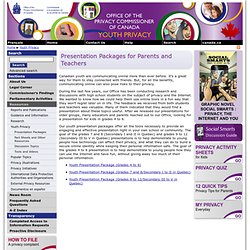
It’s a great way for them to stay connected with friends. But, for all the benefits, communicating online can also pose risks to their privacy. During the last few years, our Office has been conducting research and discussions with high school students on the subject of privacy and the Internet. We wanted to know how we could help them use online tools in a fun way that they won’t regret later on in life.
The feedback we received from both students and teachers was valuable. Our youth presentation packages offer all the tools necessary to provide an engaging and effective presentation right in your own school or community. ‘Selling Out’ Is Meaningless